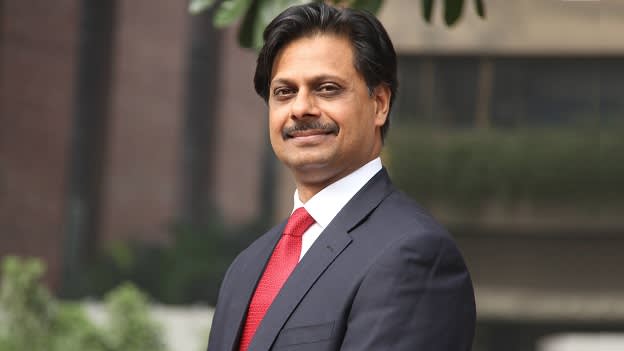B-Schools don’t just shape best talent, but catalyze problem solving

Abhilash Misra, Director of the India and South Asia Outreach at the Chicago Booth School of Business holds the responsibility for building the brand and visibility for the business school in this region. With diverse experience in multinationals like AXA Investment Managers, Standard Chartered Bank and Indian organizations like ICICI Bank and Aditya Birla Group, he has set up and managed operations in retail and corporate sales, banc assurance, strategy and has led large scale business transformations. He is also a Marshal Goldsmith Certified Executive Coach.
You have had a diverse career. What was the motivating factor to change fields and focus your energies towards education?
I started my corporate journey in the hospitality sector and changed a couple of roles till I got a break into financial services. Throughout my career, I’ve had a variety of roles and profiles to handle. Working with some of the best growing and forward looking companies helped me in building core competencies and forge strong relationships. After working for about 15 years, I realized that there was some learning that was needed to be done. There was a need to take some bigger challenge and I looked forward to reskilling with a view to enrich my career journey. It was then when I came across Chicago Booth’s Executive MBA program. This program was first launched in 1943 in Chicago for working professionals and now is run at campuses in Chicago- North America, Hong Kong- Asia and London-Europe. It provided the same academic rigor and access to intellectual capital and an influential global alumni network with specialized experience for mid and senior professional.
Chicago Booth is a place of learning and unlearning, where the focus is to attempt problem solving using fundamentals of business and management. After passing out, my continuous involvement with the school activities in this region sparked off a desire to showcase more of the true Chicago Booth credentials, to the outside world. The close knit and warm alumni network in India has been supportive to the school’s effort in not only recruiting the brightest of candidates for our programs but also in providing access to their organizations for internships and job opportunities for Booth graduates. I volunteered as an alumni interviewer for prospective candidates and also helped in various information sessions by interacting with prospective students to give them an insider’s idea of Chicago Booth. All along I felt that we have such a rich heritage and we work on such path breaking ideas, why should we not bring such knowledge to India. My aim was to start conversations. During the same time the University of Chicago of which Chicago Booth is a part, established a full-fledged research center on Asian studies in New Delhi and this very strongly reflected the commitment on their part to bring together academia, policy makers and citizens together for research and meaningful collaborations. I am really proud of my association with the school now as a full time employee to help in building a rich community of students and alumni.
How do you teach problem solving? Is it something that you can really learn in a classroom?
Our basic approach to the problem is identifying the core reasons of a problem. The innovation lies in not following a prescriptive model. If you look at our full time MBA program, we have only one compulsory subject on leadership- LEAD. The rest of the subjects are chosen by the student. We believe that each student comes with a different world view and aim to pursue the MBA and so we give them the option of choosing what they want to study and from whom. The learning should fit in their broader life goal. Students are given autonomy in curating their courses and what this does is that it brings an interdisciplinary approach to problem solving. It helps to get a diverse perspective and our students can get joint degrees as well from different schools within the University of Chicago. The curriculum we follow uses 4 key pillars that look at problem solving. Out of the four, the first addresses the importance of human perspectives and conditioning in decision making - understanding the psychology of humans. Then there is a need to look at collective human behavior, so we look at sociology. The other two pillars look at the problem from a statistical point of view and then analyzes it with respect to the fundamentals of economics. So the aim of the program is to use these 4 pillars for effective decision making. When you ask whether this can be learnt in a class, it can be, but only when a structured and methodical way is followed to attack and deal with the problem. Good theory adopted by the class enables the outcomes to come back as case studies for further learning. That is how Chicago Booth builds a holistic model of knowledge sharing and perspective building.
As organizations grow more complex, they seek special talent. What role does a business school play in this ecosystem?
For me, a business school is basically a catalyst. It is just not providing the best leadership talent but is also constantly shaping new trends through thought leadership and trying to solve world problems through research and policy influence. Research that happens in business schools often influences the way people perceive the future. A lot of the research that we do is on real issues and is backed by data. The second role is of a consultant and advisor. A lot of our professors work closely with corporations in helping them build future capabilities by identifying gaps and providing interventions through advice or Executive Education. Especially with the Indian companies, it helps the professors access data from an Indian standpoint to support their research. They share these researches and studies for increasing an organization’s understanding of the environment as well.
Looking at the trends, in your experience what are companies expecting to get from a B-school of your caliber? How does the Chicago Booth programs stay updated and keeps up with trends?
We have now moved into more of a service and knowledge economy. Organizations have become leaner and smarter in handling talent. Some of the expectations that top managers have today relate to young professionals who are able to perceive uncertainty better, can bring in their business skills and navigate faster and eventually contribute beyond the fixed role. When I did my school, the leadership course LEAD was only a part of the full-time program and now it is also in curriculum of the Executive MBA program. Thus providing the pure Chicago Booth experience to all students across programs and also helping the mid-level professional to rediscover themselves and adapt to the changing environments. The Executive MBA program provides modular way of learning with a general manager’s perspective. The same professors fly in from Chicago and teach across campuses in London and Hong Kong. Small class sizes provide better learning opportunities. Along with this, the program offers the option of choosing concentrations in capital markets, corporate finance, entrepreneurship, marketing, strategy or leadership and management. This helps them build additional knowledge and competencies in these fields. For the professors too, it is a great opportunity to interact with the top-level CXOs and take back their experience and learning from different cultures and organizations. Even the full time program offers courses on entrepreneurship and analytics which are favorite amongst students and also industry relevant. So there is a successful effort by the school to equip the students with the proper tools to function effectively outside and stay at par with the current pace.















